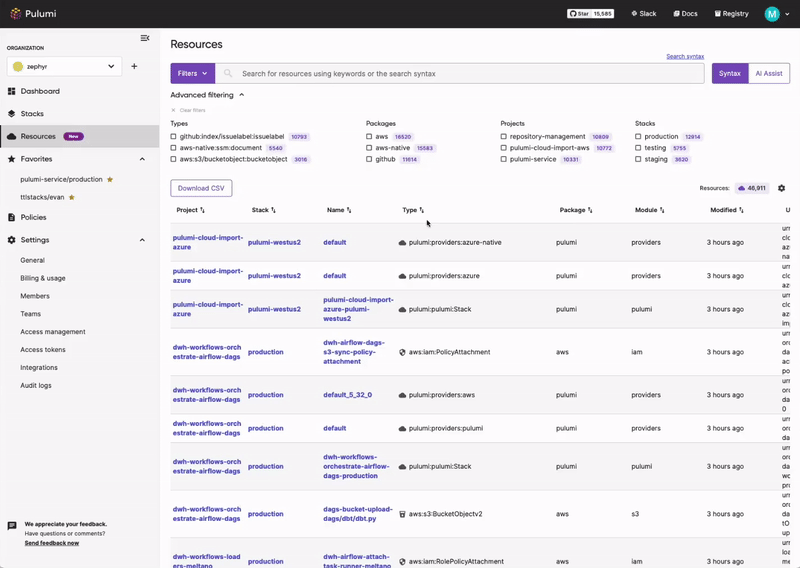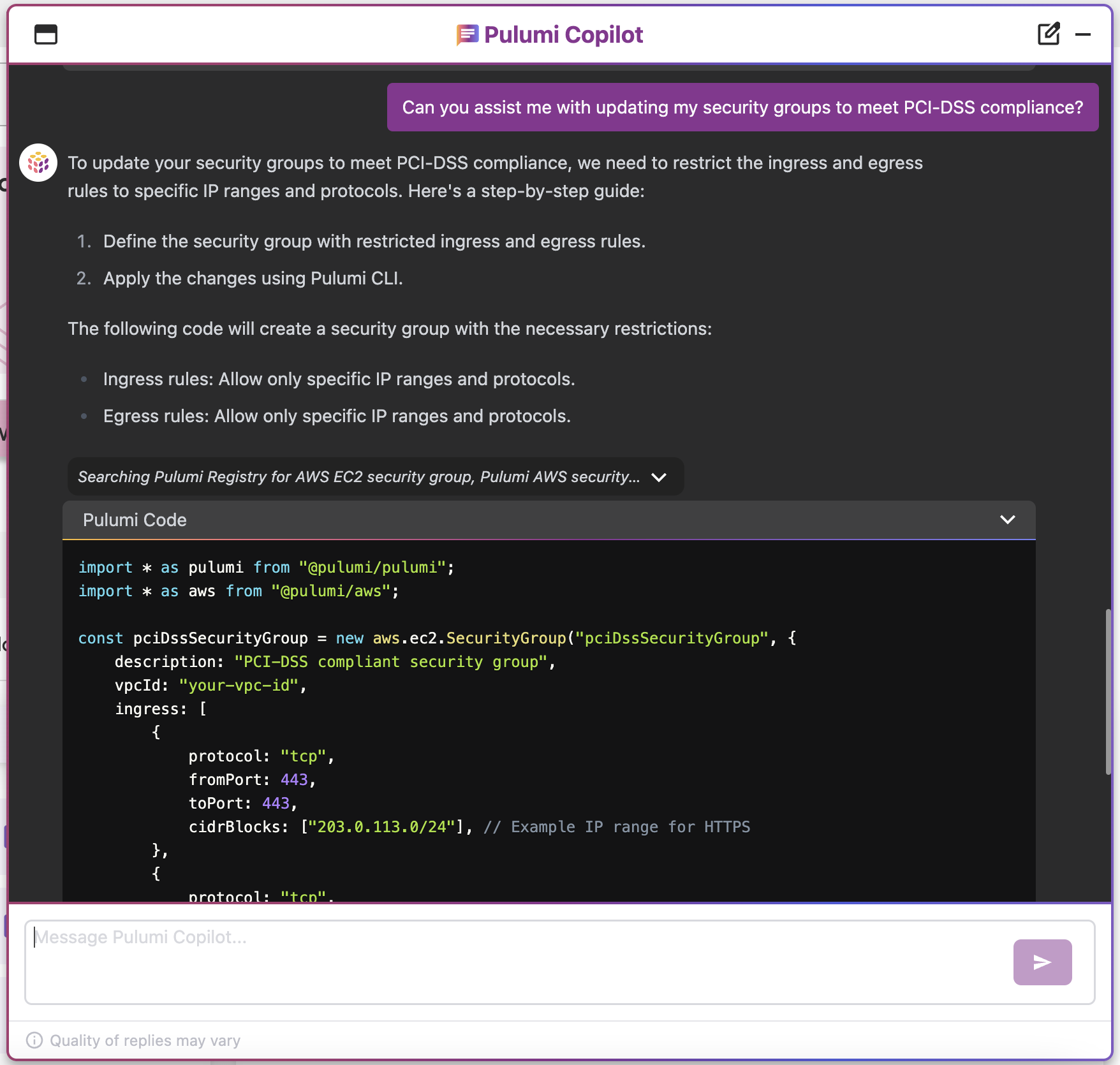How to Achieve ISO 27001 Compliance for Azure SQL Database
How to Achieve ISO 27001 Compliance for Azure SQL Database
ISO 27001 compliance is essential for ensuring the security and management of sensitive information across your organization. Pulumi can assist you in making your Azure infrastructure ISO 27001 compliant. Pulumi can help you identify existing cloud resources that are not in compliance, and it can also enforce compliance policies proactively before infrastructure is deployed. Get started with Pulumi to use these compliance tools or speak with a Solutions Architect to get an expert consultation.
What is ISO 27001 Compliance?
ISO 27001 is an internationally recognized standard for establishing, implementing, maintaining, and continually improving an information security management system (ISMS). It helps organizations protect sensitive data by providing a risk-based approach, ensuring that security measures are proportionate to the risks faced. ISO 27001 is based around the following 3 pillars: confidentiality, integrity, and availability. By achieving ISO 27001 certification, organizations demonstrate their commitment to robust information security practices and regulatory compliance.
Key Aspects of ISO 27001 Compliance
- Risk Management: ISO 27001 requires organizations to assess risks related to their information assets and implement controls to mitigate these risks.
- Security Controls: The standard includes a comprehensive set of security controls (outlined in Annex A) that cover areas like access control, cryptography, physical security, and incident management.
- ISMS Implementation: Organizations must establish an ISMS, which is a systematic approach to managing sensitive company information so that it remains secure. This involves setting policies, procedures, and controls.
- Continuous Improvement: ISO 27001 emphasizes the importance of continually monitoring, reviewing, and improving the ISMS to adapt to changing security risks and business needs.
- Compliance and Certification: Organizations can seek certification to ISO 27001 by undergoing an external audit conducted by a certification body. Certification demonstrates that an organization has implemented best practices for information security management.
- Legal and Regulatory Requirements: ISO 27001 helps organizations comply with legal, regulatory, and contractual obligations related to information security.
Pulumi Insights
Use Pulumi Insights to gain visibility into your cloud infrastructure's configuration to assess ISO 27001 compliance. Pulumi Insights is Intelligent Cloud Management. It helps you gain security, compliance, and cost insights into the entirety of your organization's cloud assets and automatically remediate issues.

Pulumi Copilot
Use Pulumi Copilot to assist configuring your infrastructure to make it compliance ready. You can tap into the Pulumi Copilot's deep understanding of your organization's context to gain visibility into the configuration of resources and assess their compliance.

Compliance Ready Policies
With comprehensive coverage of Azure, Pulumi Compliance Ready Policies provide an enhanced level of control and governance over your cloud resources. Pulumi Compliance Ready Policies empower you to enforce best practices, security standards, cost controls, and compliance requirements seamlessly within your infrastructure-as-code workflows.
What is Azure SQL Database?
Azure Database is a suite of fully managed, scalable, and secure relational database services designed for various database engines, including SQL Server, MySQL, PostgreSQL, and MariaDB. These services handle tasks like backups, patching, and high availability, allowing developers to focus on building applications rather than managing infrastructure. With features like built-in security, automated scaling, and integration with Azure ecosystem tools, Azure Database ensures seamless data management for enterprise and cloud-native applications.
What controls can I put in place to evaluate Azure SQL Database resources?
- Azure SQL Database backups should be private
- Azure SQL Database instances should prohibit public access, as determined by the Public Network Access configuration
- Azure SQL Database instances should have encryption at-rest enabled
- Azure SQL Managed Instances and database backups should be encrypted at-rest
- Azure SQL Database instances should be configured with availability zones for high availability
- Azure SQL Database instances should have monitoring enabled with Azure Monitor or Log Analytics
- Azure SQL Managed Instances should have automatic backups and geo-replication enabled
- Azure SQL Database instances should have automatic backups enabled
- Azure SQL Database instances should have deletion protection enabled
- Azure SQL Database instances should log activities to Azure Log Analytics
- Azure Active Directory (Azure AD) authentication should be configured for Azure SQL Databases
- Azure SQL Database instances should have automatic backup enabled
- Azure SQL Database clusters should have automatic minor version upgrades enabled
- Azure SQL Managed Instances should have transparent data encryption (TDE) enabled
- Azure SQL Database instances should be configured with availability zones for high availability
- Azure SQL Database instances should be configured to copy tags to backups
- Azure SQL Database instances should be deployed in a Virtual Network (VNet)
- Existing Azure SQL Database event notification subscriptions should be configured for critical database events
- Azure SQL Database event notification subscriptions should be configured for critical database performance events
- Azure SQL Database instances should use non-default ports for connections
- Azure SQL Database instances should use custom administrator usernames
- Azure SQL Database instances should be protected by a backup and recovery plan
- Azure SQL Managed Instances should be encrypted at rest
- Azure SQL Database instances should be tagged
- Azure SQL Database backup and recovery configurations should be tagged
- Azure SQL Database instances should be tagged
- Azure SQL Database security policies and rules should be tagged
- Azure SQL Database subnet groups should be tagged
- Azure SQL Database clusters should log audit events to Azure Monitor
- Azure SQL Database instances should have automatic minor version upgrades enabled
Speak to a Solutions Architect to implement policy as code to manage SQL Database resources for ISO 27001 compliance.
Talk to a Solutions Architect
Get in touch with our Solutions Architects to get all your resources in use with Pulumi Insights